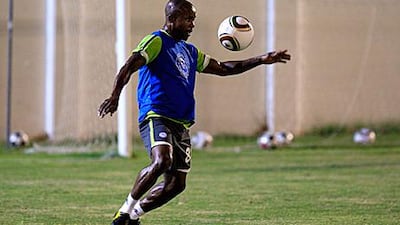For every Fabio Cannavaro the Pro League has an Abass Lawal - a foreign-born player who does not play for a big club, is not paid enormous amounts of money and even drives his own car.
Lawal has been a key performer for three low-profile domestic clubs in five seasons in the UAE. But he gives value for money, or he would not still be here.
The speedy forward from Nigeria is in his second season with Al Dhafra, the Western Region-based side who sit 10th in the 12-team Pro League table. Previously, he spent one season with lower-division Ras al Khaimah, then two with Al Khaleej of Fujairah, scoring 23 goals as the club won promotion to the Pro League, and seven goals in their one-year stay at the top level.
Victories for such clubs can be sporadic. Aspirations are modest. A mid-table finish for Al Dhafra would be a huge success.
So why does Lawal stay with it?
For the same reason he did not give up when he was a lonely and depressed teen who had been signed by Atletico Madrid: for the love of the game and to support himself and his family.
He recalls being 17, in Madrid, outside the first team. He was isolated from family and friends and did not speak Spanish. Atletico had signed him on the strength of his performance for the Nigeria Under 16 team in a tournament in Portugal in 1996. Nigeria had won the competition, and Lawal stood out.
The youngest of six children, he signed for five years at the recommendation of his brother, Oladimeji, the head of the family who had played for the Nigerian national team and had spells with Real Madrid in Spain and Kortrijk in Belgium.
"He told me it was a great opportunity." But adjusting to life far from home was difficult.
"I found life very hard in the first three years in Spain," Lawal said. "I was lonely and depressed, and I was very young. I didn't know the language to get around. Yet the love for the game and to succeed after being given the opportunity, kept me going.
"But things started to change and life became much better for me after I picked up the language. I had a few injuries that hindered my progress but I have had a good time in my chosen profession."
Lawal spent the first three years from 1997 with the Atletico second team and the remaining two years in the first team, making six appearances in 2000/01, when the club was in the second division.
He suffered injuries towards the latter part of his career at Atletico and the club decided not to renew his contract. He also lost the opportunity to play for Nigeria. He was called up twice by the Nigerian Football Association in 2001. However, he was nursing groin injuries at the same time.
He remained in Spain, playing for Cordoba, CD Leganes, Albacete Balompie and Xerez, all in the second division.
He suffered a knee injury that put him out of action in 2005. He conceded he was not at the same level when he came back.
He was preparing to return to the Spanish second division when he got an offer before the 2006/07 season from Ras al Khaimah, a second-tier UAE club.
"It was a pretty decent offer and I also wanted a change," Lawal said. "Of course it is difficult for those who have ambitions to play in the lower division, but for me, it's still better than not playing."
He did well, leading the club in scoring. He and his RAK coach, Abdul Wahab Abdul Kader, moved to Al Khaleej of Fujairah, where he spent two seasons. In the first, Lawal scored 23 goals as Khaleej were promoted to the Pro League. But he scored only seven in the next season as Khaleej were promptly relegated.
Lawal, however, stayed in the Pro League, signing with Dhafra for whom he scored 14 goals, the fifth-best total in the league. The team rewarded the forward, who pairs with Boris Kabi in the Dhafra attack, with another contract.
Dhafra are on seven points after eight matches, but Lawal is confident they can avoid relegation and remain in the Pro League.
"There are a lot of games and we can win a few to improve our position in the league," he said. "Dhafra is a pretty good side with some very talented Emirati players, and if we can finish in mid-table, it would be a great achievement."
Married for three years now, Lawal's wife is expecting their first child in two months. He makes a point of returning to his home in the southwestern Nigerian city of Ibadan for one month each year.
Lawal is good at table tennis and also likes to swim and play snooker, but hates to drive, a chore some foreign players escape because they have their own drivers.
"I am driving because I don't have a choice," he said. "I would rather be picked up and dropped off at home. So I am at home spending most of the time in front of the TV, watching football."
And while he is not paid like Cannavaro (who reportedly will make as much as Dh22.5 million this season), he holds one advantage over the Italian international. Dhafra stunned Cannavaro and Ahli 2-0 in the first week of the season. Lawal scored the first goal.


